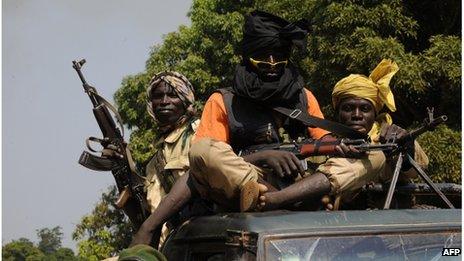Central African Republic ceasefire signed
- Published

Rebels fighting the government in the Central African Republic have signed a formal ceasefire following talks in Gabon.
The rebels and president agreed to the formation of a unity government, which will reportedly be formed on Saturday.
The Seleka rebel alliance took control of northern and eastern CAR in a four-week offensive starting on 10 December.
It has accused President Francois Bozize of breaking previous peace deals.
Friday's ceasefire agreement was signed in Gabon's capital Libreville after three days of talks mediated by neighbouring countries.
President Bozize has invited the opposition and all parties to return with him to Bangui so that this new government could be put in place on Saturday.
New elections
The deal envisages the dissolution of the country's National Assembly, and the appointment of a prime minister from the opposition bloc ahead of legislative elections that would be held in 12 months.
The top UN official for the Central African Republic, Margaret Vogt, said the ceasefire agreement, witnessed by the regional grouping Economic Community of Central African States (ECCAS) - was to come into force within 72 hours of being signed.
Under the political agreement:
- President Bozize will remain in power until end of his mandate in 2016
- A new prime minister will be appointed from the opposition with full powers to run the government for 12 months (renewable)
- An inclusive government of national unity will be established and run for 12 months (renewable); this govt cannot be removed from office by the president
- The government of national unity will be headed by the prime minister, who will also be head of government
The government of national unity will be tasked with:
- Restoring peace and security
- Organising legislative elections after the dissolution of the national assembly
- Re-organising the security forces
- Re-organising the ministry for territorial administration and expanding government authority
- Reforming the judicial system
- Implementing rebel demobilisation and security reform programmes with help from the international community
- Undertaking reforms of the economic and social sectors
Rebel spokesman Eric Massi described the truce as "a good deal to bring peace".
"But the ceasefire is contingent on several of our demands being met and we will judge Mr Bozize's sincerity in the coming days," he told Reuters news agency.
Chad President Idriss Deby, who attended the signing ceremony, said the deal would allow Mr Bozize to complete his mandate, which expires in 2016.
"We have not undermined the integrity of the constitution of Central African Republic," he said. "President Bozize was elected for a five-year term and he should carry on until that is finished."
The rebels had previously called for the president's resignation, the departure of South African troops and the release of political prisoners in return for a truce.
South Africa this week began sending about 400 troops to help stabilise CAR, while forces from neighbouring countries were also sent.
Both the US and France, the former colonial power, turned down government pleas for help against the rebels.
The rebels only halted their advance 100km (60 miles) from Bangui after the regional peacekeeping force was deployed.
It is the biggest threat Mr Bozize has faced since he took power in a coup in 2003.
CAR is one of the poorest countries in Africa, despite its considerable mineral resources.
- Published12 January 2013
- Published11 January 2013
- Published22 August 2023